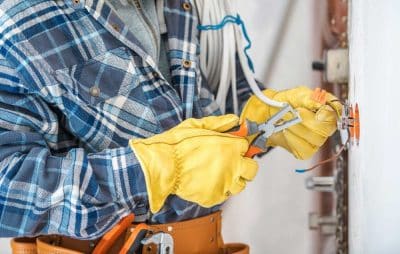
Homeowners often find themselves unsure of the risks associated with their home’s electrical system. From faulty appliances to overloaded circuits and wet conditions to DIY work, it is essential to be aware of the potential for electric shocks in your own home.
In this article, we will outline ten common causes of electric shocks at home, arming you with the knowledge needed to mitigate these risks and ensure that you and your family are safe from electrical dangers.
1. Faulty Electrical Appliances
Staying on top of appliance maintenance is key for preventing electric shocks at home. Frayed cords, exposed wiring, and damaged plugs can all increase the risk of electrocution. Maintain your appliances regularly and replace any damaged or old parts quickly.
Additionally, it’s important to be mindful when using electrical appliances in wet areas, such as bathrooms or outdoor areas, and always ensure that the circuit is not overloaded by plugging too many devices into one outlet. Safeguarding your home with these precautions can help make it a safer place.
2. Overloaded Circuits
One of the leading causes of electric shocks at home is overloads on circuits and outlets. Incorrect wire size is the major reason. When wiring your house, knowing what size of wire for a 30 amp breaker is needed is crucial.
Using the wrong wire size can be hazardous and cause fire too. An electric current might overload the wiring when excessive equipment is connected to one socket.
This could be extremely dangerous if someone touched a wire, as they could be electrocuted. To avoid this, try to plug only what is necessary into one outlet and ensure your home has enough power sockets for all devices. Additionally, surge protectors can help provide additional protection against electrical shocks.
3. Wet Conditions
It is very easy for an electric shock to occur at home when it is wet or humid. Unprotected wires are particularly vulnerable to the elements, so it’s essential to check outdoor wiring for signs of damage and make sure it is properly rated for moisture.
Also, watch for any cables running through water-logged areas that could become easily damaged. Your home can be protected against electrocution by following these precautions.
4. Damaged Wiring
Poor wiring is one of the most common causes of electric shocks. Over time, wiring can become damaged or wear down, creating a malfunctioning circuit that could lead to dangerous leakage of electricity and the risk of electric shock.
It’s essential to look for any signs of damaged wiring, such as cracks or breaks in cable insulation, and replace any old cables immediately if necessary.
5. Extension Cords
The ability to plug more devices into your home can be increased with extension cords and power strips. However, it’s important to remember that these cords and strips are not designed for the same level of current as regular outlets.
Overloading them with too much electricity can spell big trouble, leading to electric shocks or even fires. To keep yourself safe, use only properly rated extension cords and power strips for your intended purpose, avoiding overloaded circuits at all costs.
6. DIY Electrical Work
Performing electrical work requires knowing what you’re doing to be safe. Therefore, any DIY electrical project should be conducted with the utmost care and understanding of the risks involved. Even small jobs such as changing a light switch or installing a ceiling fan can have dire consequences if done incorrectly.
To avoid potential danger, it’s best to leave all major electrical work to qualified professionals who are knowledgeable about the latest safety standards and regulations. This way, you will ensure everything is done correctly and safely, protecting you and your family from potential harm.
If you wish to do minor repairs or replacements yourself, it is possible, but only if you understand the basics of electricity and follow all safety guidelines.
DIY electrical work should never be taken lightly, as it can have serious repercussions when not done correctly. Always entrust major projects to an experienced professional trained in the most up-to-date safety regulations to keep everyone safe.
7. Lightning Strikes
Lightning strikes can be less common, but still a significant source of electric shocks and shock waves in the home. An electric shock can result from lightning striking exposed wiring or components if it comes in contact with them.
Cover all exposed wiring properly and use surge protection devices for large appliances like air conditioning units to protect yourself from this hazard.
8. Improper Grounding
Improperly grounded electrical systems can also pose a risk of electric shocks. Likewise, faulty wiring or appliances may create a shock hazard in your home if the system is not properly grounded.
A licensed electrician should inspect the wiring in your home to ensure good grounding for your and your family’s safety. Additionally, installing ground fault circuit interrupters (GFCIs) can be beneficial in reducing the risk of shock from appliance failure or defective wiring.
9. Human Error
Human errors like forgetting to switch off a switch or plugging too many appliances into one outlet can also lead to electric shocks. Similarly, inadequate maintenance of electrical connections can increase the risk of electric shock.
Inspection of all electrical connections by a licensed electrician should be done regularly to check for corrosion or any other damage. In addition, all electrical cords should be kept in good condition, and any frayed or otherwise damaged cords should be replaced immediately.
10. Children Playing With Outlets And Switches
It is important to watch children, who may be curious and tempted to explore outlets and switches. Installing covers on switches and outlets can help protect them from electric shock in these cases.
It’s also important to teach children why they should not play with electricity. Assure they know the importance of always following safety precautions when working with electrical equipment.
Conclusion
Electric shocks can be caused by various factors, both human error and improper maintenance. Therefore, be aware of the different sources to protect yourself from electric shocks.
Preventing electric shocks in the home can be accomplished by educating children about the dangers of playing with electricity and by installing safety equipment.
Check our other article for saving more energy with electric heaters.









